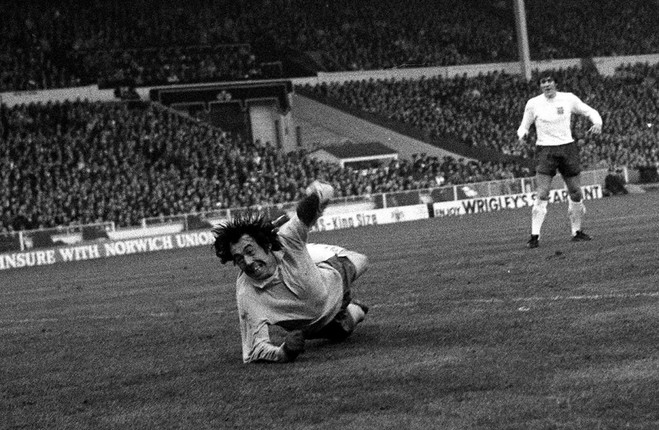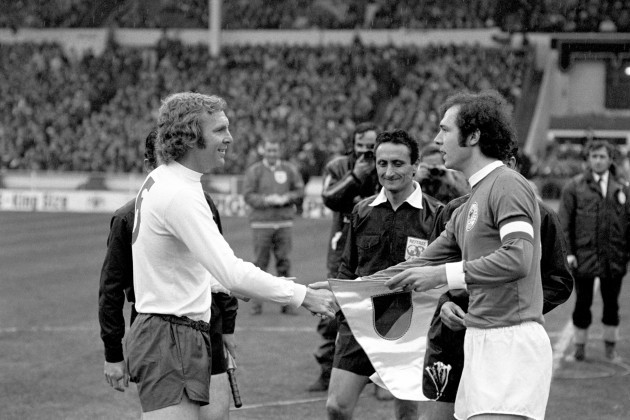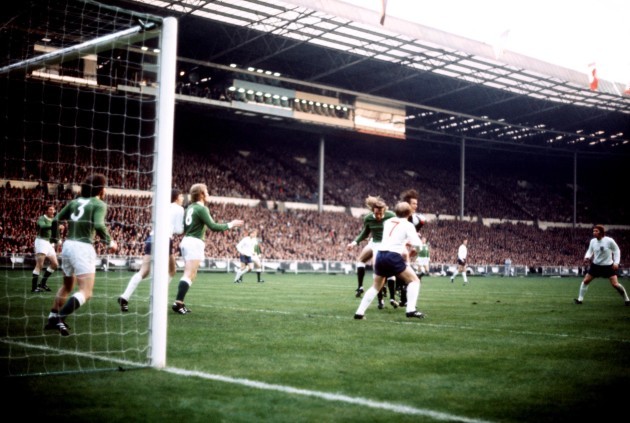Below is an edited extract from Euro Summits: The Story of the Uefa European Championship by Jonathan O’Brien.
In 1972, West Germany were competing at the European Championships for the very first time, and travelled to Wembley to face the lately-deposed world champions England in the first leg of the quarter-finals, led by their lustrous-haired playmaker, Günter Netzer.
EXTRAORDINARILY GIVEN THE eventual outcome, West Germany’s preparation for their match of matches at Wembley was shrouded in gloom.
‘Leave the fear at home!’ begged a headline in Kicker magazine’s preview. ‘If we don’t lose by five, we’ll have achieved a good result,’ Netzer said to Beckenbauer, half-joking, during the flight to London.
Beckenbauer laughed off the comment. But he and Bayern Munich, who supplied the core of the team, were in disarray after bad defeats by Köln (5-1), Duisburg (3-0) and Rangers (2-0).
Helmut Schön was without some familiar faces. Wolfgang Overath and Berti Vogts were injured, the Schalke 04 match-fixing scandal ended the international careers of Reinhard Libuda and Klaus Fichtel, and fitness issues ruled out the veteran Karl-Heinz Schnellinger. In came Breitner (20), Hoeneß (20) and Georg Schwarzenbeck (22), all from beleaguered Bayern.
On the morning of the match, goalkeeper Sepp Maier awoke with an inflamed elbow, and understudy Wolfgang Kleff was put on standby. Maier would play, but his ailment was kept secret (even from Schön) until after the game.
The manager himself was green around the gills from a stomach bug.
And green was the colour as West Germany walked out at a packed Wembley in their Ireland-like change strip. It was a rainy Saturday evening, but Netzer later described the conditions as ‘perfect … these unique lawns [were] like a pool table, with an incredible atmosphere. The ground was perfectly smooth. It had just rained, it was perfect for our technique.’
English nostrils flared early on. Paul Madeley crunched Netzer from behind, and Alan Ball stood on him as he tried to get to his feet. Shortly afterwards, Francis Lee spitefully tried to kick Herbert Wimmer as they tussled near the touchline. But roughing up these Germans was never going to be enough.
The usual home-and-away dynamics were swiftly inverted as England massed nearly their entire team in their own half and West Germany streamed forward. With nobody getting tight on Netzer – a tactic almost unheard of in 1972 – it was all too easy for Schön’s team. The opening goal wasn’t long in coming. Moore tried to dribble past two opponents in his own box but gave the ball away, and Müller cushioned it to Grabowski, who laid it off to Hoeneß.
The shot was weak, but its dipping trajectory made a fool of Banks, who seemed to slip as it drifted between him and his right-hand post.
Soon, another bout of German inter-passing forced Moore to deflect Netzer’s shot behind for a corner. As the English centre-halves stood around like the showroom dummies Kraftwerk would later sing about, Wimmer’s glancing header forced Banks into a good save.
Though Emlyn Hughes’s volley clipped the bar in the second half, West Germany stayed in command – and England’s equaliser felt unearned when it came. Beckenbauer’s lazy ball was intercepted by Bell, who exchanged passes with Madeley and hit a strong shot which Maier couldn’t hold.
Lee followed up to tap in from almost under the bar.
Although 1-1 would still have been a great result for West Germany, they now promptly broke England over their knee. With five minutes to go, Held streaked up the left. Moore made sure to trip him outside the box – but referee Robert Héliès, well behind the play, gave a penalty. Although Banks got both hands to Nezter’s kick, it squeezed over the line via the post.
West Germany’s masterfully economical third goal epitomised the chasm between the teams. Held robbed the hapless Hughes and found Hoeneß, who beat two men and played a lovely reverse pass for Müller to rattle a shot on the turn inside the post. Müller would later win the 1974 World Cup Final with a very similar effort.
The sight of England having their eye wiped at Wembley by foreign interlopers would become a familiar one in later years. But in 1972, an experience like this was nothing short of an acid bath for English football.
Other than the Hungarian humiliation of 1953, long enough ago to be dismissed as an aberration, teams simply did not walk all over England in their own backyard. The match had been close in some respects – the outcome wasn’t settled until the final minutes, and England never gave up – but exhibition-like in others.
In truth, Alf Ramsey had signed his team’s death warrant by letting Netzer have the freedom of Wembley. Ulfert Schröder, the German sportswriter, noted, ‘There has hardly been a Bundesliga game in which Netzer has had as much leeway as he enjoyed here.’
Today, the German footballing public regard it as the greatest match ever played by any of their national sides, to the point of calling the line-up Der Wembley-Elf.
An awestruck L’Équipe described the German performance as ‘football from the year 2000’, while Gazzetta dello Sport called it ‘picture-book football that shocked the English’.
At home, Bild went for ‘Ramba Zamba Fußball’, fairground football. In England, the headlines were bleak: ‘Oh, what a black day for England’ (Sunday Express); ‘Funeral in Berlin is all we can expect’ (Sunday People). But Ian Wooldridge of the Daily Mail noted, ‘These 11 German players have buried more hatchets in 90 minutes than all the diplomats in the last 27 years … this was a German team to make a nonsense of the pulp magazine conception of the German character, and to make a few million adults realise that their prejudices are as obsolete as Bismarck’s spiked helmet.’
It was one man’s day above all others. In his 1978 autobiography, Fußball, Schön wrote, ‘I will never forget this image all my life: as he stormed through the midfield under the floodlights with his long, flowing blond hair, the ball on his foot – that was just a glorious sight.’ No prizes for guessing who the manager was on about.
‘Netzer twirled his baton, and everyone danced to his tune,’ Ludger Schulze purred in Die Mannschaft, a 1986 history of the German national team.
Netzer himself, decades later, put it even more simply. ‘I don’t like these inter-generational cross-comparisons – but at Wembley, we were very close to perfection. There was harmony among all of us. I don’t remember ever playing in a team that exuded such joy. But that doesn’t mean you’re going to win. You can play a great game and still lose. In this particular case, that would have been tragic.’
With admirable optimism, Moore, Rodney Marsh, Martin Peters and Martin Chivers posed in Avengers-style bowler hats for a Daily Mirror photoshoot before flying out to Berlin for the second leg a fortnight later. But there the jocularity ended, as Ramsey had Netzer terminated with extreme prejudice. ‘The whole England team have autographed my leg!’ he groaned at the end of a grim, violent match in which Norman Hunter and Peter Storey repeatedly brutalised him while referee Milivoje Gugulović looked the other way.
England had effectively swapped one type of humiliation for another: Ramsey’s crude containment strategy extinguished whatever chance they had of turning the tie around. It was the baldest of admissions that his team lagged light years behind their opponents.
Early on, Marsh glanced a corner goalwards and Chivers lunged for it, but Horst-Dieter Höttges blocked on the line. Netzer hit a dipping free kick just over, and Held went closer when his shot on the run grazed the top of the bar.
In the second half, Schwarzenbeck cleared under pressure from Marsh in West Germany’s goalmouth. And that was your lot, from both teams.
West Germany reacted caustically to Ramsey’s caveman tactics. Schön described the worst challenges as ‘brutal tackling aimed at the bones’, while Beckenbauer said England had ‘confused the football pitch with a jungle’.
In response, Alan Ball pig-headedly called the Germans ‘cry-babies’ and accused them of trying to ‘make villains of us’, in another example of unwillingness to face footballing reality.
The 1970s weren’t going to get any better for England after this.
Euro Summits by Jonathan O’Brien is published by Pitch Publishing and is available now.



